Page 1 of 1
Ambient heat engine design theory
Posted: Mon Jun 12, 2023 8:24 pm
by VincentG
While trying to design an easy to 3-d print compressor housing for an electric turbocharger, added to an altered state, I thought of this scenario. It's so easy, I will prototype one asap.
Forgive the crude sketch and poor penmanship, It's late and my favorite motto is "fail cheap, fail fast"
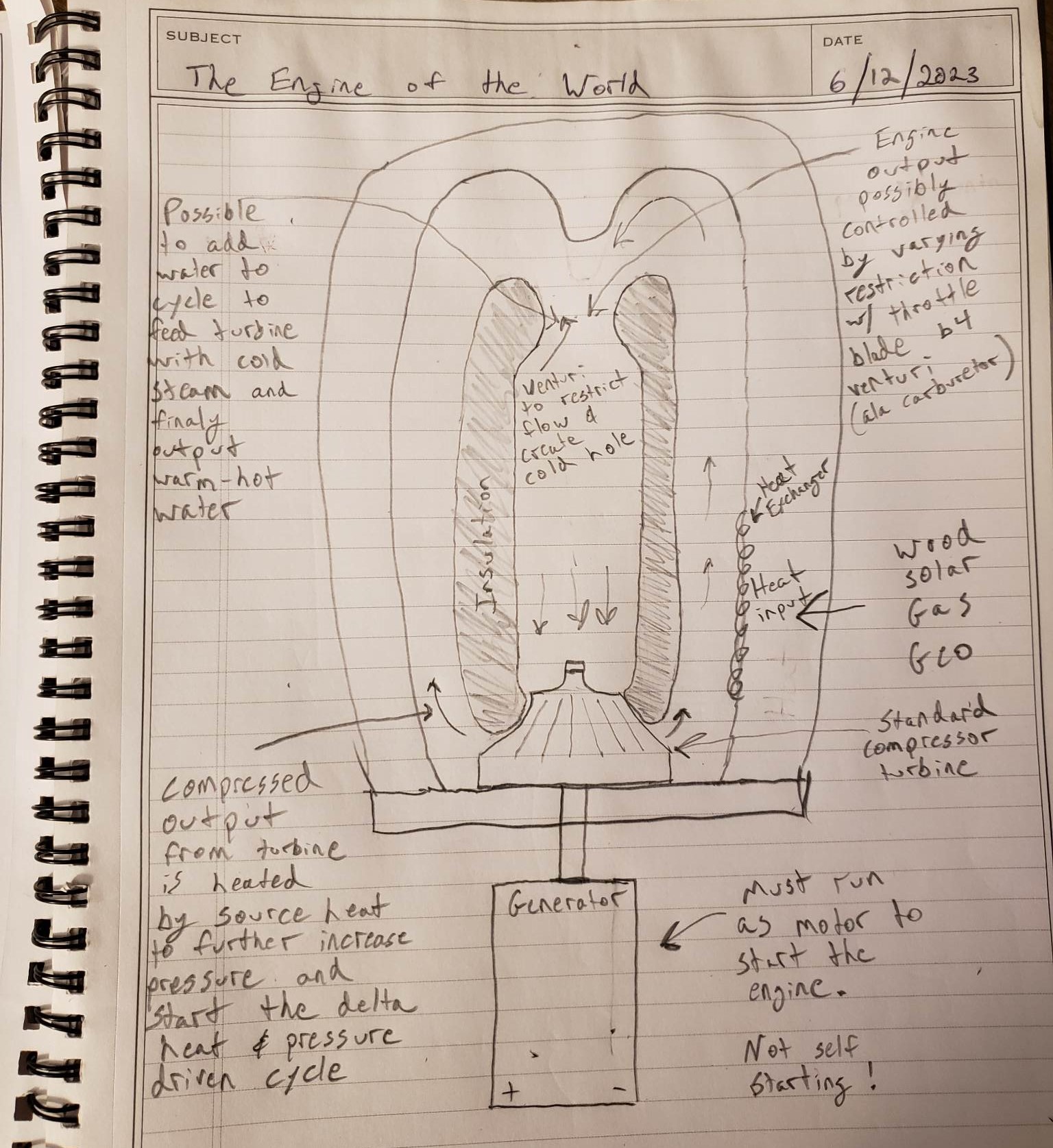
- the eotw.jpg (506.67 KiB) Viewed 2462 times
Re: Ambient heat engine design theory
Posted: Tue Jun 13, 2023 10:39 am
by VincentG
I forgot a note to consider a tesla valve to allow the heated air to rise while preventing backflow into the turbine.
Re: Ambient heat engine design theory
Posted: Fri Jul 07, 2023 9:20 am
by MikeB
What's the comment on the left, about "cold steam" all about?
Re: Ambient heat engine design theory
Posted: Fri Jul 07, 2023 3:19 pm
by VincentG
Cold steam is something Nikola Tesla talked about. If a great enough vacuum can be achieved, the water internal to the system could boil. This would provide more force to drive the turbine.
I should add that I didn't fully explain the cycle. The turbine is not necessarily what will compress the air and maintain the cycle, although it may contribute as well. The turbine is just to extract energy from the system and drive a generator.
The driving force of the cycle is a Tesla valve where the external heat is supplied and the compression occurs.
Re: Ambient heat engine design theory
Posted: Sun Jul 23, 2023 9:06 am
by Tom Booth
I have a suspicion, if such an arrangement could work, it might work better with the turbine at the top, since the work output would help cool the air before descending.
I had a similar idea for a kind of solar/ambient heat engine using hydrostatic pressure/vacuum to boil water
If a column of water is raised high enough in a tube, with no air in the tube, eventually, at a little over 10 meters the water level will go no higher and the water will begin to boil (by ambient heat).
Suppose a turbine were placed above that point in the tube and the tube draped back down through a concrete/brick tower.
I'm amazed when I walk into our brick building how nice and cool it is inside on a hot summer day without air conditioning.
The turbine could drive a generator through a magnetic coupling.
Some means of emptying or draining the accumulated condensed water from the inner side of the columb could be a problem.
A variation on the saturated vapor thing.
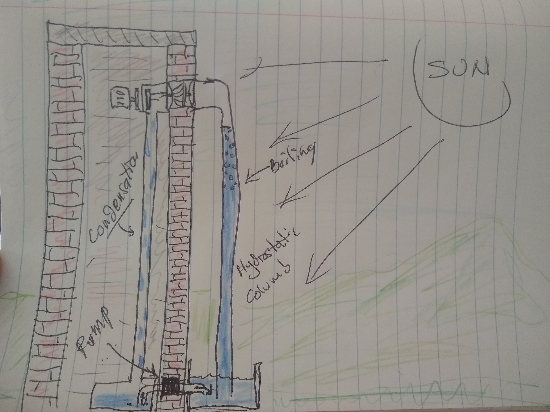
- Resize_20230723_113830_0230.jpg (154.69 KiB) Viewed 2175 times
This "cold steam" turbine is a similar, or the same using a vacuum but lacks the hydrostatic element for generating the vacuum.
https://m.youtube.com/@iEnergySupply/videos
Re: Ambient heat engine design theory
Posted: Tue Jul 25, 2023 7:04 pm
by VincentG
I agree it might make more sense to have turbine at the top and driven directly by hot gas.
Interesting idea Tom. The concept is similar, contain a naturally occurring force(wind in my example, or evaporation in your case) inside a closed system and harness the cycle of energy.
Re: Ambient heat engine design theory
Posted: Wed Jul 26, 2023 12:01 am
by Tom Booth
VincentG wrote: ↑Tue Jul 25, 2023 7:04 pm
I agree it might make more sense to have turbine at the top and driven directly by hot gas.
...
Or perhaps both top and bottom in the manner of a turbocharger or bootstrapped expansion turbine.
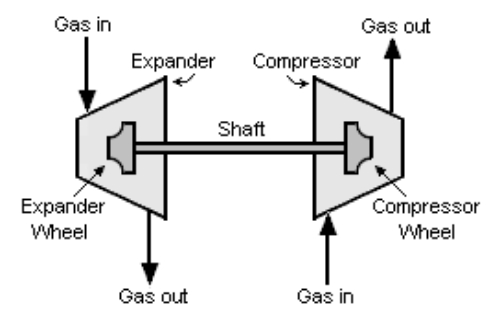
- Resize_20230726_025737_7741.jpg (30.66 KiB) Viewed 2137 times
https://en.m.wikipedia.org/wiki/Turboexpander
Turned sideways with the expander on top and compressor at bottom of your center cold duct.
Re: Ambient heat engine design theory
Posted: Sun Jul 30, 2023 4:26 pm
by VincentG
After spending some time observing constant and steady wind on a fire tower atop a ridge near my house, I'm more certain than ever that the key to hot air engine efficiency is harnessing a constant flow of energy.
It's well excepted that if we had a closed loop of pipe with a heat source on one end, there would be internal air movement due to convection. This can also be observed in closed loop hot water systems. This is the basic driving force behind wind.
The ambient heat engine shown above would be an attempt at harnessing a much more powerful natural weather cycle, but in a closed loop.
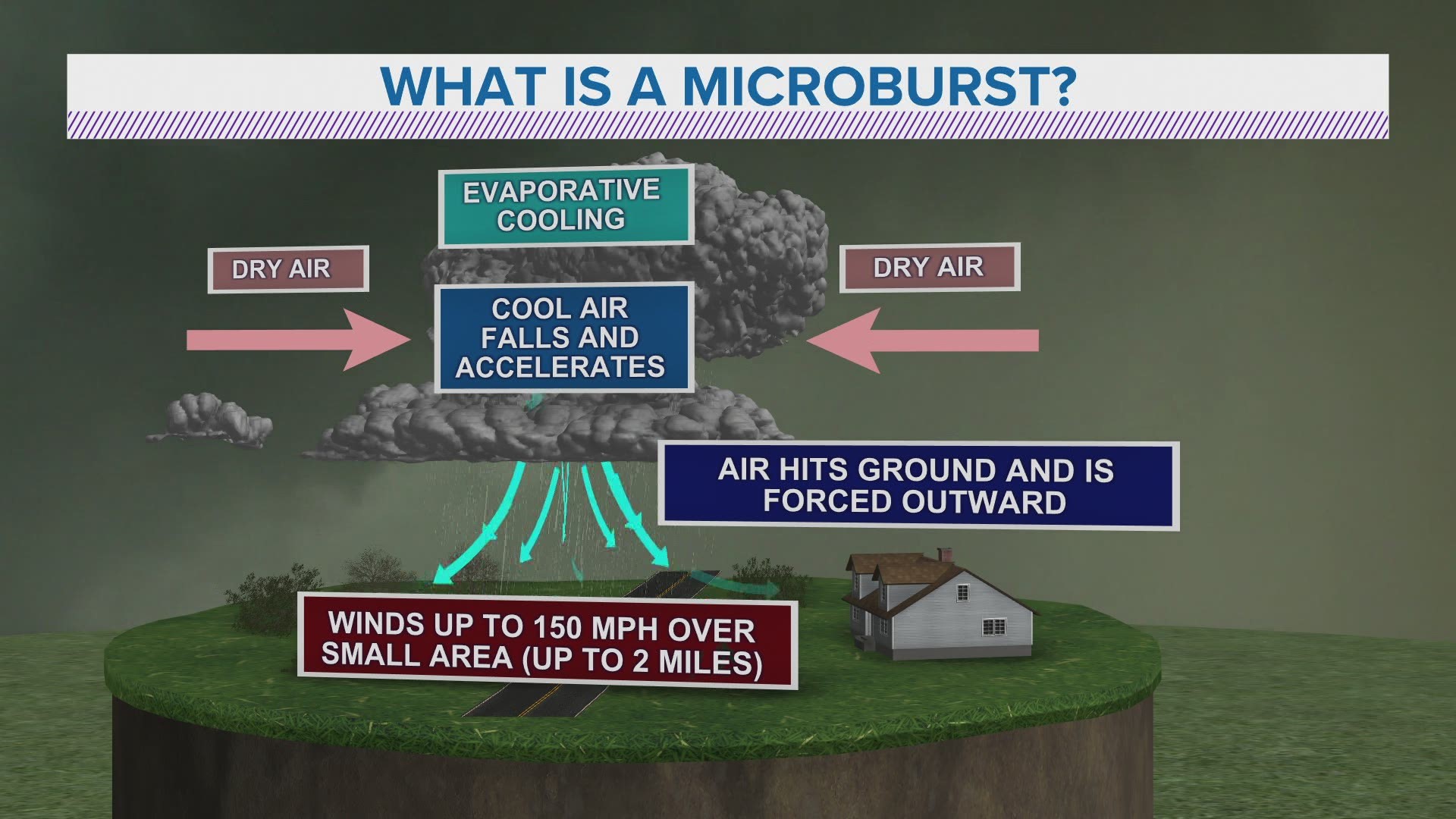
- microburst.jpg (304.65 KiB) Viewed 2094 times
It's rather alarming how much information is available on the formation of hurricanes and tornadoes, compared to the downburst storm shown here. This could be in part due to the seemingly simple requirements to start the storm. In the real world the downburst storm is not closed cycle and is therefore very short lived.
Compared to a tornado, the laminar flow path lends itself well to being contained in a closed loop chamber. Unlike in this thread,
viewtopic.php?f=1&t=5539 , the available energy will come more in the form of mass flow rate of the working gas than in the available pressure swing.
I struggle to imagine how this cycle could not be replicated in a closed cycle and contained in a chamber. However, unlike most hot air engines, this might be much more effective at very large scale. It may also be greatly aided by an alcohol mixture to further increase evaporative cooling.
Re: Ambient heat engine design theory
Posted: Mon Aug 07, 2023 9:51 am
by VincentG
By pure coincidence a microburst occurred over my house this weekend. Its quite a phenomenon and waves of hail could be seen up above like they were being shot out under extreme force.
Looking at the hail it became apparent that the shape of hail can be seen as a snapshot in time and used to analyze the cycle.
Here is one such hail stone.
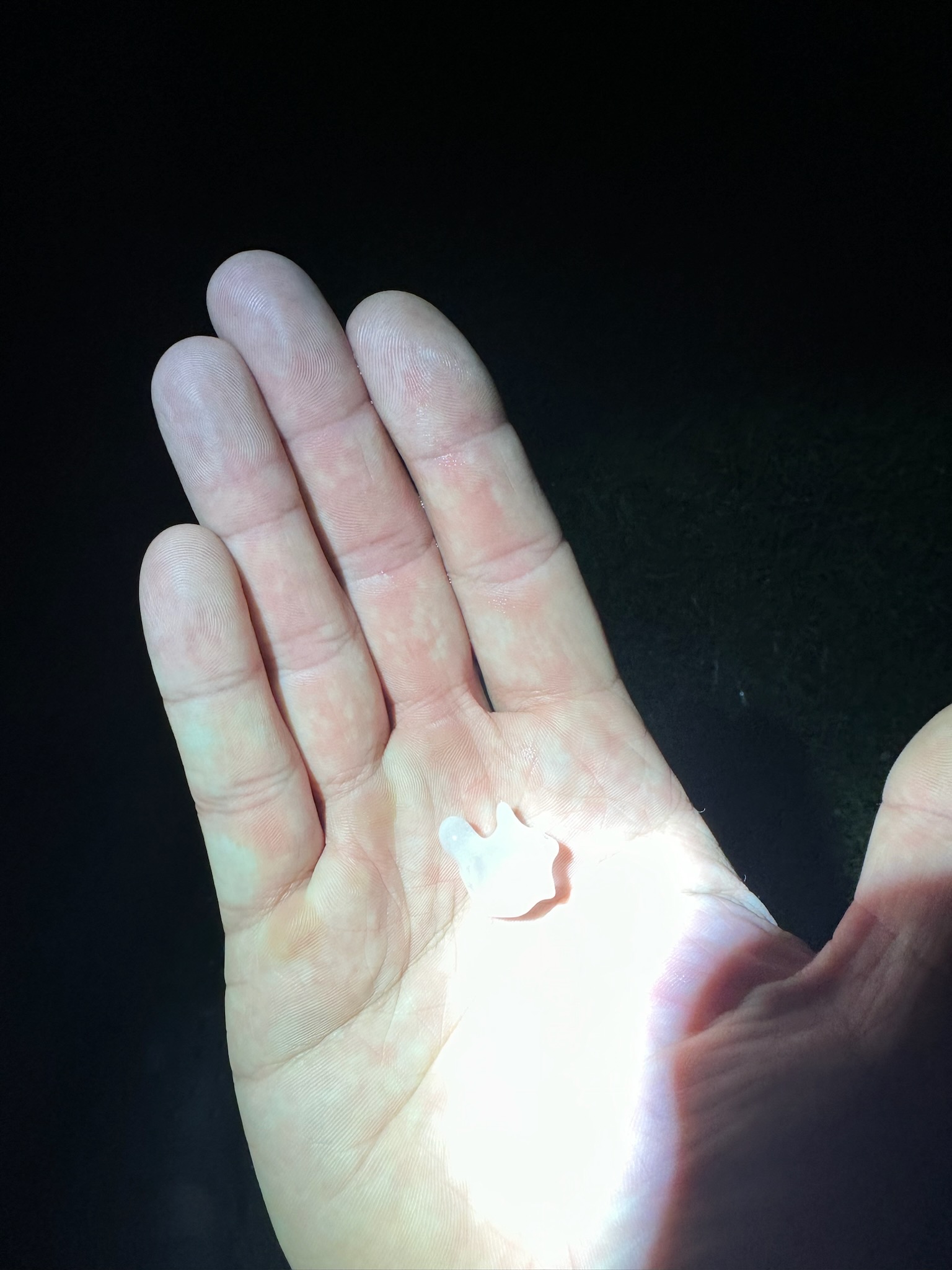
- IMG_0549.jpg (431.32 KiB) Viewed 2000 times
Perhaps this shows how suddenly and calmly the air is cooled down during a microburst type storm.
Other hail stones paint a vastly different picture. (Not my picture)
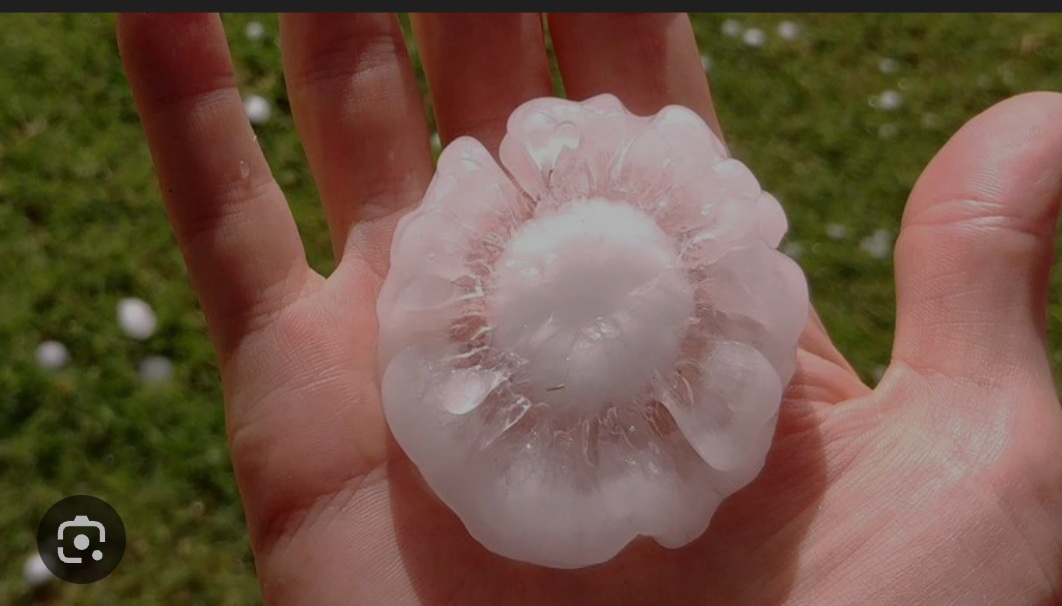
- 20230807_122715.jpg (120.82 KiB) Viewed 2000 times
An interesting article on hail stone thermodynamics
https://www.sciencedirect.com/science/a ... 0variables.
An interesting thing to note about a microburst is that the cold space becomes the driving force of energy as heavy dense air plummets rapidly down to the ground.
On a side note, if we apply this effect to a piston engine, the piston should be facing down just like in an LTD to take advantage of the air mass falling down away from it. So possibly an even greater vacuum is reached in cylinder than we can account for mathematically. This would also lend well to up-scalling piston engine size.